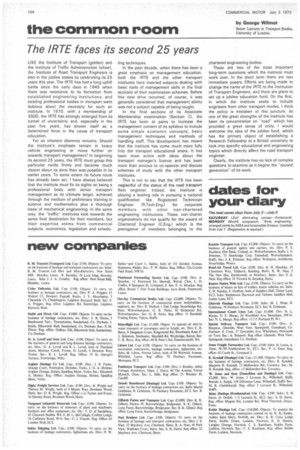the common room
Page 106

If you've noticed an error in this article please click here to report it so we can fix it.
The IRTE faces its second 25 years
LIKE the Institute of Transport {golden) and the Institute of Traffic Administration (silver), the Institute of Road Transport Engineers is also in the jubilee stakes by celebrating its 25 years this year. The IRTE has had a long uphill battle since the early days in 1945 when there was resistance to its formation from established engineering institutions, and existing professional bodies in transport were dubious about the necessity for such an institute. In 1970, with a membership of 5500, the IRTE has strongly emerged from its tunnel of uncertainty and, especially in the past five years, has shown itself as a determined force in the cause of transport education.
Yet an inherent dilemma remains. Should the institute's emphasis remain in heavy vehicle engineering or move further on towards transport management? In beginning its second 26 years, the IRTE must grasp this particular nettle firmly and become much clearer about its aims than was possible in its earlier years. To some extent its future route has already been set. I have always believed that the institute must fix its sights on being a professional body with senior transport management as its ultimate target, achieved through the medium of preliminary training in science and mathematics plus a thorough basis of mechanical engineering. In the same way, the "traffic" institutes look towards the same final destination for their members, but their expertise stems from commercial subjects, economics, legislation and schedu
ling techniques.
In the past decade; when there has been a great emphasis on management education, both the IRTE and the other transport institutes have inserted subjects dealing with basic tools of management skills in the final sections of their examination schemes. Before this new drive occurred, of course, it was generally considered that management ability was not a subject capable of being taught.
In the final sections of its Associate Membership examination ISection C), the IRTE has been at pains to increase the management content of its syllabus to include some simple economic concepts, basic management techniques and methods of handling staff. This development has meant that the institute has come much more fully into the transport educational arena. It has been most active with ideas about the transport manager's licence and has been more than anxious to co-operate and discuss schemes of study with the other transport institutes.
This is not to say that the IRTE has been neglectful of the status of the road transport fleet engineer. Indeed, the institute is playing a leading role in pursuing a national qualification like Registered Technician Engineer (R.Tech.Eng.) for corporate members with other non-chartered engineering institutions. These non-charter organizations do not qualify for the award of Chartered Engineer (C.Eng.) which is the prerogative of members belonging to the chartered engineering bodies.
These are two of the most important long-term questions which the institute must work over. In the short term there are two immediate posers. Efforts are being made to change the name of the IRTE to the Institution of Transport Engineers, and there are plans to set up a jubilee education fund. On the first, in which the institute seeks to include engineers from other transport modes, I think the policy is mistaken at this juncture, as one of the great strengths of the institute has been its concentration on "road" which has provided a great sense of unity. I would welcome the idea of the jubilee fund, which has the primary object of establishing a Research Fellowship at a British university to look into specific educational and engineering topics which directly affect the road transport engineer.
Clearly, the institute has no lack of complex questions to examine as it begins the -second generation" of its work.




































































































































































